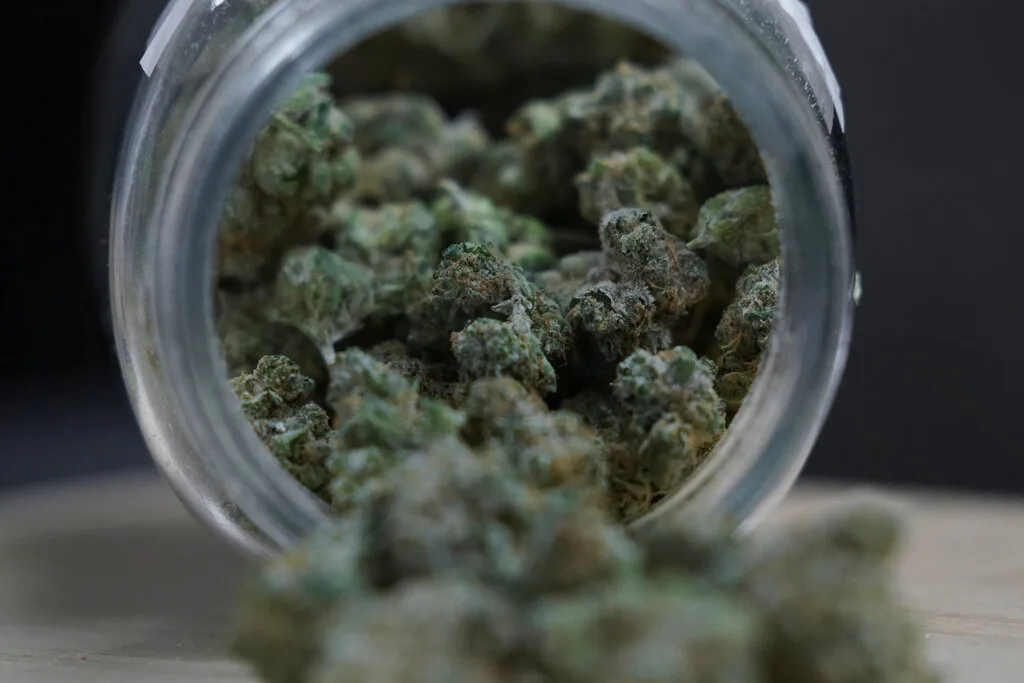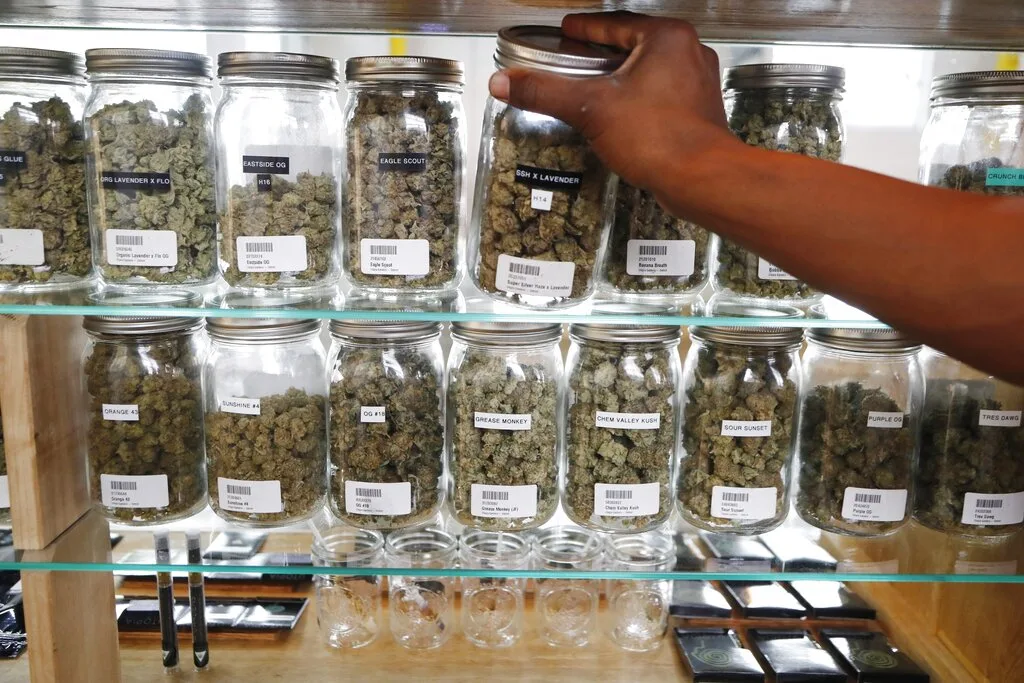
Marijuana buds are shown at Huron View Provisioning in Ann Arbor, Mich., Thursday, Jan. 28, 2021. (Source: AP Photo/Paul Sancya)
A story of progressive policy, public advocacy, economic transformation, and the best marijuana on the planet.
There’s no shortage of weed in the Great Lakes State.
State sales reports show that more than 750 dispensaries across Michigan sold more than $3 billion worth of cannabis products in 2023, marking the first time that annual sales have topped $3 billion and putting the state on pace to become the cannabis capital of the country.
The rapid growth of the recreational marijuana industry in Michigan has been hard to miss: Michiganders are officially spending more money on weed than dairy products. And annual state tax revenue from the sale of weed recently surpassed that of beer, liquor, and wine combined.
Of course, weed wasn’t always as easy to come by in Michigan. About five years ago, it was illegal for most Michiganders to possess marijuana at all—much less buy it over the counter.
Curious how we got here?
In the tapestry of progressive reform in Michigan, few threads are as colorful as the state’s journey to legalizing marijuana. Let’s unpack the story, starting with the prelude of prohibition, the crescendo of legalization, and the symphony of economic success that has followed.
Prohibition
Before 2008, weed was a risky business in Michigan.
Grow operations were mostly in basements. Orders were usually placed through a series of cryptic text messages that led to quick parking lot meetups with friends of friends. Those who were caught possessing marijuana could face up to a year in jail and fines of up to $2,000.
The caregiver days
Michigan became the 13th state to legalize marijuana for medical use after voters overwhelmingly approved a ballot initiative in 2008 known as the Compassionate Care Initiative.
For the first time, Michiganders—with their doctors’ approval—could receive a prescription card to legally possess up to 2.5 ounces of weed. The law also created a caregiver system in which Michiganders could grow a limited number of plants to provide for a limited number of patients.
The law didn’t specifically allow for dispensaries, but dozens of them opened anyway over the next few years, leading to a legal battle over the so-called “gray” areas of the caregiver system.
Early dispensaries

In this Oct. 2, 2018, photo, a clerk reaches for a container of marijuana buds for a customer at Utopia Gardens, a medical marijuana dispensary in Detroit. (Source: AP Photo/Carlos Osorio, File)
A Michigan Supreme Court ruling in 2013 found that the 2008 medical marijuana initiative didn’t allow for dispensaries to operate in the state, leading to many dispensaries closing statewide.
Many of those shops never reopened; others were put back in business under a package of bills signed by Republican Gov. Rick Snyder in 2016 that formally allowed for the operation—and regulation—of medical dispensaries, including a new 3% tax rate on medical cannabis sales.
Recreational use

Josh Hovey, spokesman for the Coalition to Regulate Marijuana Like Alcohol, speaks at a news conference on Monday, Nov. 20, 2017, at an office building in Lansing, Mich. The group submitted more than 360,000 signatures for a 2018 ballot drive to legalize the use of marijuana for recreational purposes. (AP Photo/David Eggert)
By 2017, Michiganders were growing tired of watching other states legalize weed for recreational use and rake in the millions of dollars in tax revenue that came along with it.
More than 365,000 signatures were submitted to send a ballot initiative to the polls. And in 2018, Michiganders were able to vote on whether weed should be made legal for adults.
The results were clear: In addition to electing Gov. Gretchen Whitmer that year, Michiganders also voted to legalize pot for adults and create a new system for recreational dispensaries.
The first legal joints were smoked on Dec. 6, 2018—and this writer celebrated the occasion by passing out a shoebox filled with joints to pedestrians in downtown Lansing. It took another year—until December 2019—for the state’s first recreational dispensary to open its doors.
Cannabis capital

Cannabis gummies are packaged in Jackson, Mich., Wednesday, March 2, 2022. (Source: AP Photo/Paul Sancya)
In recent years, the recreational cannabis market has blossomed into a lucrative industry.
Michigan retailers now sell more recreational weed annually than those from any other state besides California—and well more than any other state in the country on a per-capita basis.
The latest state reports show that Michigan is now home to more than 750 pot shops, 1,000 cultivation operations, 250 processing facilities, 24 safety testing labs, and 22 cannabis transportation companies that collectively employ nearly 35,000 Michiganders.
And we’re still growing. More than $276.7 million in recreational weed sales happened in December 2023 alone. That’s nearly enough to set a new monthly sales record for Michigan.
Perhaps the best part? Weed is more affordable than ever. The average ounce of weed right now costs only about $95—down $255 from 2020—or about $3 for a fat, one-gram joint.
Want to learn more?
|
The ‘Gander has a free newsletter about all things cannabis in Michigan. It’s called The MichiGanja Report, and we send it out every other Thursday at 4:20 p.m. Click here to subscribe, and we’ll send the next edition straight to your inbox. |
Support Our Cause
Thank you for taking the time to read our work. Before you go, we hope you'll consider supporting our values-driven journalism, which has always strived to make clear what's really at stake for Michiganders and our future.
Since day one, our goal here at The 'Gander has always been to empower people across the state with fact-based news and information. We believe that when people are armed with knowledge about what's happening in their local, state, and federal governments—including who is working on their behalf and who is actively trying to block efforts aimed at improving the daily lives of Michigan families—they will be inspired to become civically engaged.


That one time in Michigan: When we had our deadliest tornado
June marked the 72nd anniversary of the deadliest tornado in Michigan’s history. Learn about the Flint-Beecher tornado, its impact, and its lasting...

75 years after the then-worst crash in US history, search ends for a plane in Lake Michigan
SOUTH HAVEN, Mich. (AP)—A group is ending a 20-year search for a plane that crashed into Lake Michigan in 1950, killing all 58 people on board,...

A guide to what the Juneteenth holiday is and how to celebrate it
It was 160 years ago that enslaved people in Galveston, Texas, learned they had been freed — after the Civil War's end and two years after President...

It’s the only Great Lake entirely within US. 10 things to know about Lake Michigan
Lake Michigan, the only one of the five Great Lakes entirely within the United States, spans the western coast of Michigan's Lower Peninsula,...

A historian explores Michigan’s secret bootlegging empire
While we all know that crime doesn't pay, the bootleggers and gangsters of a century ago have always held a certain glamour in popular imagination....






